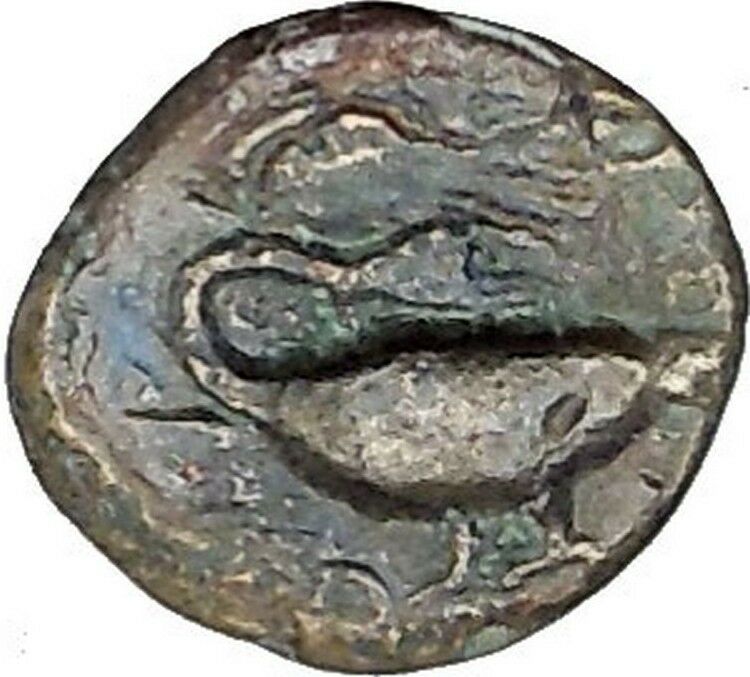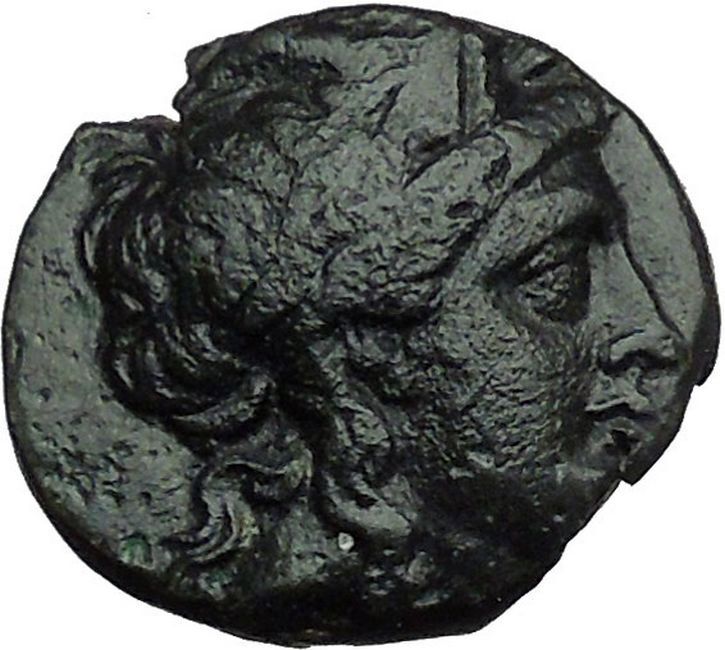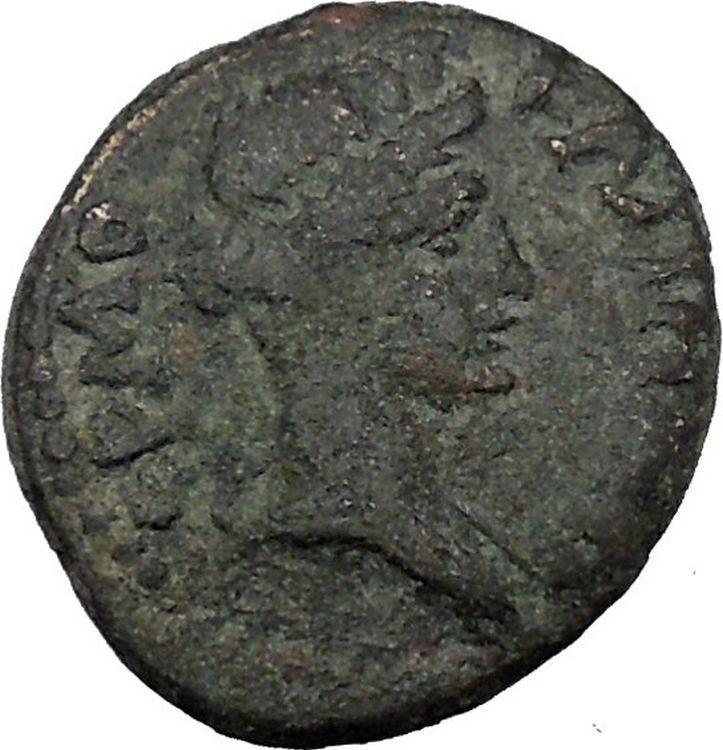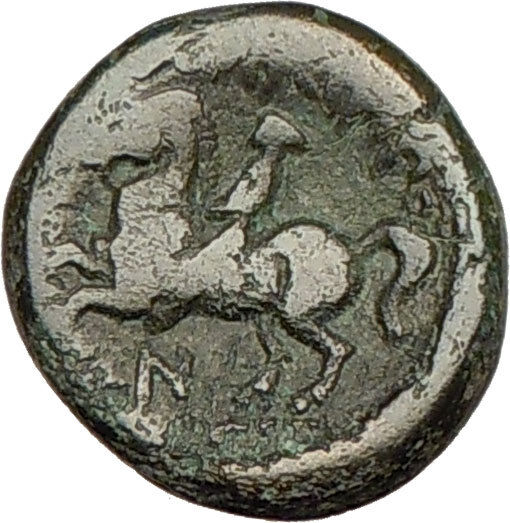|
Seleukid Empire
Antiochos III, Megas – King: 222-187 B.C.
Bronze 26mm Uncertain mint 73, Military Mint
Reference: HGC 9, 514 var. (with mahout)
Certification: NGC Ancients VG 4934589-014
Laureate head of Antiochos III right.
ΒΑΣΙΛΕΩΣ / ANTIOXOY above and below Elephant advancing right.
EXTREMELY RARE COIN and not in HGC 9, with something of similar motif and smaller size only in there which was rarity 2-3.
Antiochos III, Megas (‘The Great’) (B.C. 222-187), second son of Seleukos II Kallinikos , succeeded to the throne on the death of his brother Seleukos III Keraunos, when he was only in his 15th year. After defeating (220) Molon, satrap of Media, and his brother Alexander, satrap of Persis, who had attempted to make themselves independent, he carried on war against Ptolemy Philopator, king of Egypt, in order to obtain Coele-Seleukia, Phoenicia, and Palestine, but was obliged to cede these provinces to Ptolemy, in consequence of his defeat at the battle of Raphia near Gaza, in 217. He next marched against Achaios, who had revolted in Asia Minor, and whom he put to death, when he fell into his hands in 214. Shortly after this he was engaged for 7 years (212-205) in an attempt to regain the E. provinces of Asia, which had revolted during the reign of Antiochos II Theos ; but though he met with great success, he found it hopeless to effect the subjugation of the Parthian and Baktrian kingdoms, and accordingly concluded a peace with them. In 205 he renewed his war against Egypt with more success, and in 198 conquered Palestine and Coele-Seleukia, which he afterwards gave as a dowry with his daughter Cleopatra upon her marriage with Ptolemy Epiphanes. In 196 he crossed over into Europe, and took possession of the Thracian Chersonese. This brought him into contact with the Romans, who commanded him to restore the Chersonese to the Macedonian king ; but he refused to comply with their demand ; in which resolution he was strengthened by Hannibal, who arrived at his court in 195. Hannibal urged him to invade Italy without loss of time ; but Antiochos did not follow his advice, and it was not till 192, that he crossed over into Greece. In 191 he was defeated by the Romans at Thermopylae, and compelled to return to Asia: his fleet was also vanquished in two engagements. In 190 he was again defeated by the Romans under L. Scipio, at Mount Sipylus, near Magnesia, and compelled to sue for peace, which was granted in 188, on condition of his ceding all his dominions E. of Mount Taurus, paying 15,000 Euboic talents within 12 years, giving up his elephants and ships of war, and surrendering the Roman enemies ; but he allowed Hannibal to escape. In order to raise the money to pay the Romans, he attacked a wealthy temple in Elymais, but was killed by the people of the place (187). He was succeeded by his son Seleukos IV Philopator.
You are bidding on the exact item pictured, provided with a Certificate of Authenticity and Lifetime Guarantee of Authenticity.
 The Seleucid Empire was a Hellenistic state ruled by the Seleucid dynasty founded by Seleucus I Nicator following the division of the empire created by Alexander the Great. Seleucus received Babylonia and, from there, expanded his dominions to include much of Alexander’s near eastern territories. The Seleucid Empire was a Hellenistic state ruled by the Seleucid dynasty founded by Seleucus I Nicator following the division of the empire created by Alexander the Great. Seleucus received Babylonia and, from there, expanded his dominions to include much of Alexander’s near eastern territories.
The Seleucid Empire was a major center of Hellenistic culture that maintained the preeminence of Greek customs where a Greek-Macedonian political elite dominated, mostly in the urban areas. The Greek population of the cities who formed the dominant elite were reinforced by emigration from Greece. Seleucid expansion into Anatolia and Greece was abruptly halted after decisive defeats at the hands of the Roman army. Their attempts to defeat their old enemy Ptolemaic Egypt were frustrated by Roman demands. Much of the eastern part of the empire was conquered by the Parthians under Mithridates I of Parthia in the mid-2nd century BC, yet the Seleucid kings continued to rule a rump state from the Seleukid Kingdom until the invasion by Armenian king Tigranes the Great and their ultimate overthrow by the Roman general Pompey.
|









 The Seleucid Empire was a Hellenistic state ruled by the Seleucid dynasty founded by Seleucus I Nicator following the division of the empire created by Alexander the Great. Seleucus received Babylonia and, from there, expanded his dominions to include much of Alexander’s near eastern territories.
The Seleucid Empire was a Hellenistic state ruled by the Seleucid dynasty founded by Seleucus I Nicator following the division of the empire created by Alexander the Great. Seleucus received Babylonia and, from there, expanded his dominions to include much of Alexander’s near eastern territories.




